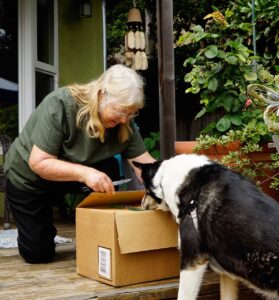 Good News
Good News
I received some amazing news last week. After a year of targeted treatment for melanoma, my PET scan came back with the report “No Evidence of Disease.” When I told my friends and family, they wanted to know “What does that mean?” “Are you cancer-free now?” So, just in case you ask, here’s what I tell them. These days doctors rarely tell their patients that they are cancer-free, because having cancer, like being an alcoholic, is a permanent condition. Instead, they are more likely to use the terms “remission,” or “NED.”
In 2021 Medical Oncologist Dr. Phat Le explained these three terms in an article written by Cynthia DeMarco for the University of Texas MD Anderson Cancer Center newsletter, Cancerwise.
“A lot of people use these terms synonymously, but “remission” and “no evidence of disease” (also known as NEOD or NED) are probably the closest by definition. Officially, both mean that no cancer is currently detectable in the body. That may be based on scans, bloodwork or some other kind of test, such as a [biopsy].
“Cancer-free” is a little more complicated, because it’s not based on something we can measure. Instead, it implies that not only is there nothing detectable in your body as cancer, but we also believe no residual cancer is left anywhere, so there’s no chance of the cancer ever coming back. And that’s a lot trickier to say because there’s always at least a very slight risk of recurrence if you’ve ever had cancer before.” (italics my own)
So “no evidence of disease” is about as good as it gets. I’ll take it.
During this year of diagnosis, surgery, treatment, and side effects, there have been many lessons. Those of you who know me also know that I like to be in control, don’t do well with change, and tend to work long hours, drawing on apparently unending energy. (Thanks, Dad. Most of those traits I inherited from you.)
And none of them are compatible with having cancer.
As I accustomed myself to not being in charge, facing continual change — of how I felt, of treatment decisions, and of having little if any energy to actually do anything — I had the benefits of an amazing medical team and friends and family who stepped in to drive me to appointments, empty my dishwasher, walk my 15-year-old Border Collie, Kismet.
Kismet. Here’s where the narrative changes.
Because Kismet died yesterday, less than a week after I received the good news that I was “NED.”
Losing Kismet
Those of you who have lost a pet won’t be surprised to know that I’m feeling very bereaved at the moment, every bit as sad and alone as I did when my mother and father passed. It seems disloyal or weird to write that, but it’s true. For over fifteen years Kismet and I shared every day, barring brief periods when I paid lots of money to people to care for her while I traveled. She accompanied me on several 1000-mile road trips to visit my parents in Canada, bravely took on challenges like herding sheep and running agility courses, and sat beside me as I wrote, read, watched movies, or lay on the couch feeling rotten. She even accompanied me last month as I bounced from one hotel to another after being evacuated from the threat of Los Angeles wildfires.
This past year was difficult for us both. As my body fought the cancer cooties, Kismet developed kidney disease and arthritis in her hips. She could no longer jump up on my bed or the couch, gradually lost her appetite, and slept more and more each day.
As I rejoiced over my NED diagnosis, Kismet struggled with stairs, uneven ground, and getting up and down from her long naps. She had lost interest in her canned kidney diet months earlier, so I began feeding her homemade meals made from cooked chicken, rice, and vegetables. That helped for a while, but about a week ago she simply stopped. She stopped eating, asking for walks, dragging her bed out from the corner to her favorite place by the fire, and sleeping beside me as I worked. Instead, she lay in her crate all day and all night. And then she stopped eating and drinking and refused the pills her vet prescribed for pain, for nausea, for her latest UTI. Her kidneys failed, and she gradually fell into a deep sleep from which it was clear she would never return.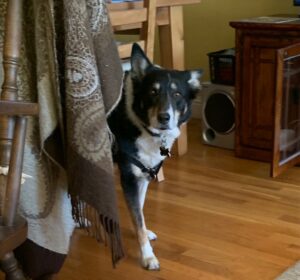
Yesterday I called an end-of-life veterinarian who came to my home and gently administered euthanasia. She was understanding and kind as she explained that she would first administer a sedative to reduce Kismet’s anxiety, and then insert an IV carrying fluid that would stop her heart. I was able to sit beside my friend, scratch that sweet spot beside her ear, and say goodbye as she went to sleep for the last time.
Last evening I tearfully sat in my empty house and sought to understand my overwhelming grief. Kismet was just a dog, right? So why was I so terribly sad? I slowly collected artifacts that reminded me of Kismet — her bed, collar and leash, toys, hairbrush, and jar of treats — and put them in the garage. It didn’t help. Eventually, I did what I always do when I’m confused or at a loss – I searched for answers.
Trying to Understand
First I turned to the internet to research the relationship between dogs and humans. For my readers who follow the PBS drama, All Creatures Great and Small, it will be no surprise that the psychologist who best explains this is John Archer, of the University of South Lancashire, UK. Dog ownership is high in the north of England, my birthplace, and my experience visiting there is that many people seem to derive more satisfaction from their relationships with dogs than those with humans. Archer says that’s because “dogs supply a type of unconditional relationship that is usually absent from those with other human beings.”
In the journal Evolution and Human Behavior Archer wrote that “for most people, the loss of a dog is, in almost every way, comparable to the loss of a human loved one. Unfortunately, there’s little in our cultural playbook – no grief rituals, no obituary in the local newspaper, no religious service – to help us get through the loss of a pet, which can make us feel more than a bit embarrassed to show too much public grief over our dead dogs.
“Perhaps if people realized just how strong and intense the bond is between people and their dogs, such grief would become more widely accepted. This would greatly help dog owners to integrate their pet’s death into their lives and help them move forward.”
Coming to Terms
So here I am, processing my grief with you, my friends, and spending Presidents’ Day going through old pictures of Kismet and me. Especially during the past year, when her presence was so very comforting. This sadness will eventually lift, I know, and my life and times with Kismet will recede into that place where I keep precious memories.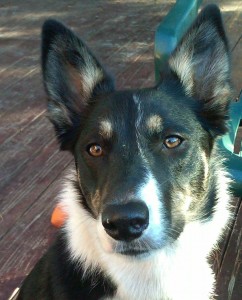
To those who suggest I get a puppy, I will say no, Kismet was my last canine companion. I’m too old to take on a 15 or 20-year commitment. It wouldn’t be fair to the animal.
Perhaps when the sadness recedes I might consider fostering a dog for the Humane Society, or perhaps I’ll get a cat. But for the moment, I will hold my grief close and be grateful for the many years Kismet and I had together.
And for being NED.
Marlene
Share this post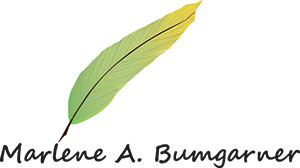

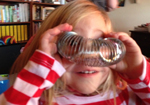

So much for you to process in such a short time! Your experience with deep grief at the loss of your beloved Kismet resonates with me. Our relationships with our dog and cat companions are uncomplicated, forgiving, enduring and precious. A dog understands us and we understand him/her on a more intuitive level than in our human relationships. Each touch, gesture and facial expression carries deep meaning. There is something about non-verbal communication that stimulates a different part of the brain, makes us feel like we belong and are fully accepted. Our shared explorations – discovering new sights, sounds and smells together, having adventures, feeling joy as the wind whips our hair/fur – bonds us in ways that chatting with a human chum cannot match. Every dog is unique. New dog, different relationship. A pup won’t replace a beloved, long-time friend.
When a human friend dies, we have other human friends to console us. We only have one, or sometimes two canine friends, and when one dies, it changes our world. When I lost one of my two dogs, I had two young children, a husband, and a demanding job. I was so busy, I had to keep grief on the back burner, but it didn’t go away. Our whole family felt the weight of the loss, especially our other dog.
May your memories and your lasting love for Kismet keep you company during the dark moments and hours. Know that others suffer as you do, and understand your pain.
Nancy, your words are so eloquent–thank you for putting into words the continuing grief I feel at the loss of my dear Kismet.
Dearest Marlene,
Happy to hear that you are “NED” and my heart breaks for you with the loss of your Kismet. I understand the deep sense of grief of losing a fur family member when I lost Miles I sobbed so deeply for days…I thought to myself, I didn’t even cry this much for my Mom and Dad…what is wrong with me? I too went online to read and research the loss and grief of a family pet/member…they are your everyday companion, the first one to greet you in the morning and good night at the end of the day…and everything in between. Hugs to you and I know Kismet is romping with Miles over that rainbow bridge!
Consuelo,
You truly understand what I have been feeling. And yes! I said to myself “I didn’t grieve like this for my parents. What kind of person am I?” A person who truly misses her companion. But I have an idea. Kismet can become a character in the cozy mystery I am writing – Death on a Sunny Morning!
So happy there’s no evidence!
Thank you, Diana!
Dear Marlene..I had just finished watching an episode of All Creatures when I read your blog. I am so sorry to hear of Kismet’s passing and I do know how devastating it is for you. It makes me wonder if she sensed that you are“safe” from cancer now and she could let go knowing that she had been there for you in your time of need? I think animals know so much more than we give them credit for.
From your blogs I get the impression that you went through this journey with your usual grace and optimism and I’m happy for you that that episode is over.
Take care of your precious self.
Kismet was special indeed! I experienced many a happy tail wags when visiting, and witnessed some of her decline over the last year. What stands out is that always you were her person. When she could no longer hear, it was still you she tracked. Our fur babies are family plain and simple. Like family their loss never goes away, but choosing to remember the good and happy times will help. As far as putting her “things” in the garage, when our retriever “told” us it was time for that final trip to the vet, I knew there was no way I could bring her collar and leash home. We were able to leave it for other dogs to use when boarding.
Above all, allow yourself to grieve in whatever way works for you, my friend.
Thank you, Barb.
Congratulations on reaching NED!
Thank you, Jenny. I do feel like it was an endeavor.
Marlene
I am so sorry to hear about Kismet. I have had so many cats and dogs thru the years and still am saddened when I think of them.l I feel for you . MM
Marlene,
That is a great confluence of very good and very sorry news. Congratulations on your recovery; and much sympathy for your loss.
Best,
Mary
Thank you, Mary.
Marlene
I’m sorry you lost Kismet and so happy you are healthy!
❤️
Marlene,
Very well articulated. You have every right to grieve for the loss of Kismet, cultural framework or not. It is normal, and you don’t have to be shy about it.
Really good that you have your ability to write to help you process for yourself, and share with others. I am sure your readers are enriched by having this connection with you.
Here’s to our future wonderful walks together Emoji
Marlene – I am so sorry for your loss. Kismet was such a good dog and glad he was there for you during the hard parts. xx
Thank you for this. I totally understand being a dog mum. X
Dear Marlene,
Yours was among the most heart-honest, touching, and well-written posts of any kind that I have ever read. The highs and lows of life and love are all-encompassed. I am so glad for your remission and glad also that I got to know Kismet more than a little during my handyman visits—such a sweetheart. The bond between you was absolute, clearly, and completely satisfying to both of you. I feel for the loss of your friend, while I am saying prayers of thanks for your healing.
Blessings always,
Oh, Marlene—
I’m just reading your blog post right now and my heart is broken for you. I am so, so sorry to hear about Kismet. In fact, I was speaking of her to my daughter Maris just a couple days ago, when somehow the word ‘kismet’ came up in conversation and I explained what it meant—and that I have a friend with a dog named Kismet.
I never met her, but I know all that she meant to you. Sending you a big hug and lots of love.
Love,
Helen
Hi, Marlene. I always enjoy reading your posts. I’ve been thinking about you now that you live in Calabasas and those fires as well as the cancer treatment you’ve been undergoing. I’m SO happy to hear of your NED news, but how bittersweet to have that good piece of news next to your sadness for Kismet! It is so mysterious how things happen. When one has experienced these apparent contradictions or strange turns, one understands how little we control things. We grow in humility then. I can perfectly understand your sadness and absolute sense of loss on Kismet’s departure from this earth. I have gone through that twice, and, yes, it is as devastating a loss as that of a parent or family member –maybe worse. As you are so good at doing, go deep into your heart and memories and get consolation from remembering the many moments and travails together and let time work its magic and lift that sadness (very) little by little. I’m sending a hug. Bea–
Thank you for your very thoughtful words, Bea. And thanks too for the hug.
Marlene